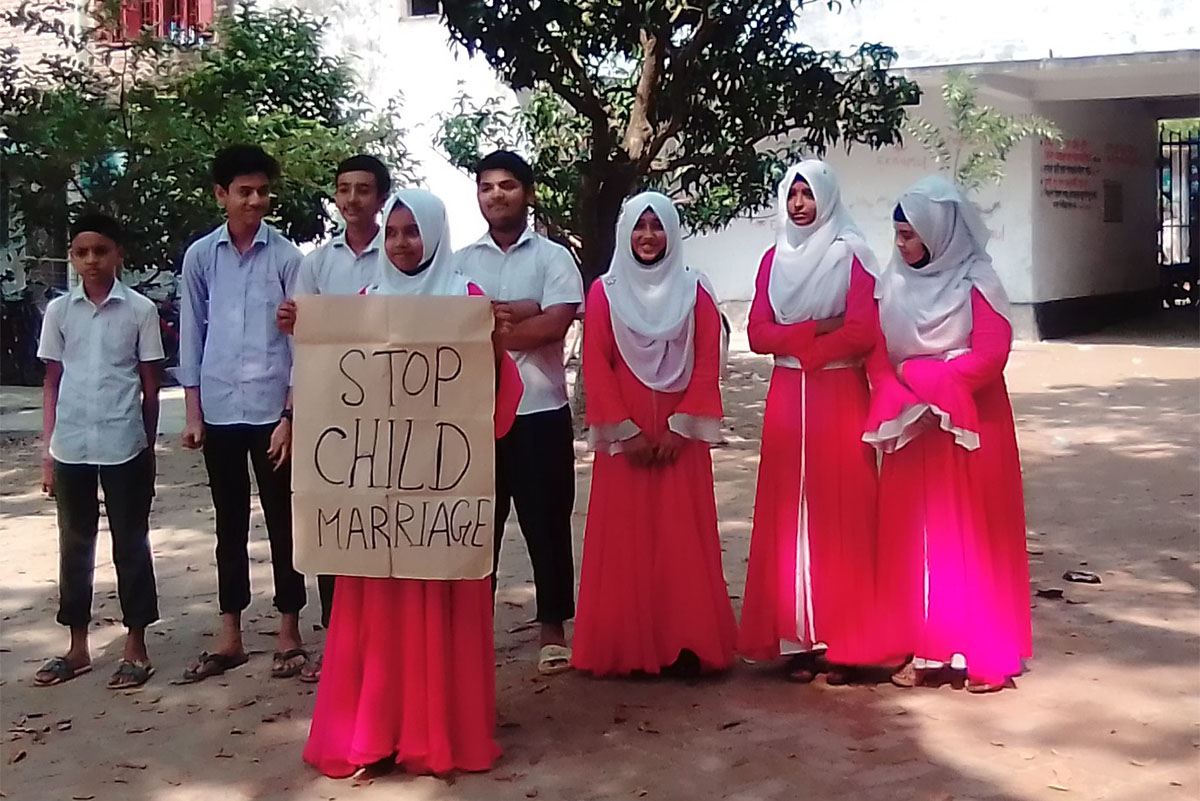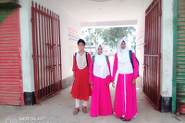
In the tranquil villages of the southwest region of Bangladesh, the insidious nexus of child marriage and poverty casts a shadow over the aspirations of young girls like Rumana. Hailing from the economically strained village of Waria in the Jhaudanga Union, Rumana’s story epitomizes the daunting challenges faced by many in this region. In the backdrop of agricultural endeavors, where families like Rumana’s rely on the toil of hardworking farmers, economic hardships often force them into desperate measures. Child marriage, a deeply entrenched tradition, emerges as a distressing consequence of poverty, perpetuating a cycle that deprives young girls of their rightful opportunities. The Youth Empowered Project becomes a glimmer of hope in this landscape, offering education and awareness to girls like Rumana.
A young girl from the village of Waria in the Jhaudanga Union of Satkhira Sadar Upazila. Rumana, the daughter of Abu Taleb, comes from an economically disadvantaged family, where she has three siblings – two sisters and one brother. Her father makes a living as a hardworking farmer, striving to provide for the family.
Rumana is a Class VIII student at Jhaudanga Secondary School. She is part of the Youth Empowered Project as a youth member. Through active participation in their monthly meetings, she became increasingly aware of the detrimental effects of child marriage, the laws surrounding it, and the significant implications for sexual and reproductive health. These found her to be inspired to stand up for her own future. When her family began discussing her marriage, Rumana courageously declared her intentions to continue her education and aware her family about the harms of child marriage. Even in the face of resistance from her family, she remained resolute in her decision.
 On August 27, 2023, everything changed. Rumana reached out to CF Farzana Yasmin, who promptly took action. Farzana brought the matter to the attention of the Headmaster of Jhoudanga Secondary School. In turn, the headmaster intervened by discussing the matter with Rumana’s guardian, but this effort was met with physical violence and an insistence on proceeding with the marriage. Undeterred, on August 28, 2023, Rumana herself reached out to the Upazila Executive Officer, using her head teacher’s mobile phone. She expressed her strong desire to continue her education and her commitment not to marry until she turns 18. She explained that family financial instability was the driving force behind the pressure to marry her off. Even her elder sister’s husband threatened to divorce her sister if Rumana did not agree to the marriage. In response to Rumana’s plea, the Upazila Nirbahi Officer wasted no time and urgently contacted the chairman of Jhowdanga UP. The chairman promptly dispatched village police and concerned ward members to intervene and halt the child marriage. They also educated the family about the legal consequences and fines associated with child marriage. The same day, law enforcement forces were sent to their house at 3 p.m. to ensure that the child marriage was prevented. With her future secured, Rumana continues to attend school regularly and actively participates in the Youth Empower project. She is thriving, finding happiness in her newfound independence and the ability to express herself. In her training sessions, she eloquently conveys, “Despite the challenges, I am happy, as I can now express myself freely and pursue my dreams without fear, all thanks to the support and intervention of those who cared for my well-being.”
On August 27, 2023, everything changed. Rumana reached out to CF Farzana Yasmin, who promptly took action. Farzana brought the matter to the attention of the Headmaster of Jhoudanga Secondary School. In turn, the headmaster intervened by discussing the matter with Rumana’s guardian, but this effort was met with physical violence and an insistence on proceeding with the marriage. Undeterred, on August 28, 2023, Rumana herself reached out to the Upazila Executive Officer, using her head teacher’s mobile phone. She expressed her strong desire to continue her education and her commitment not to marry until she turns 18. She explained that family financial instability was the driving force behind the pressure to marry her off. Even her elder sister’s husband threatened to divorce her sister if Rumana did not agree to the marriage. In response to Rumana’s plea, the Upazila Nirbahi Officer wasted no time and urgently contacted the chairman of Jhowdanga UP. The chairman promptly dispatched village police and concerned ward members to intervene and halt the child marriage. They also educated the family about the legal consequences and fines associated with child marriage. The same day, law enforcement forces were sent to their house at 3 p.m. to ensure that the child marriage was prevented. With her future secured, Rumana continues to attend school regularly and actively participates in the Youth Empower project. She is thriving, finding happiness in her newfound independence and the ability to express herself. In her training sessions, she eloquently conveys, “Despite the challenges, I am happy, as I can now express myself freely and pursue my dreams without fear, all thanks to the support and intervention of those who cared for my well-being.”
In the paddy fields of Waria, Rumana emerges as a beacon of hope, symbolizing the possibility of breaking free from the cycle of tradition. Her tale inspires change, advocating for a future where every girl can dream without the shadows of poverty and early unions, shaping futures by choice, not circumstance.

